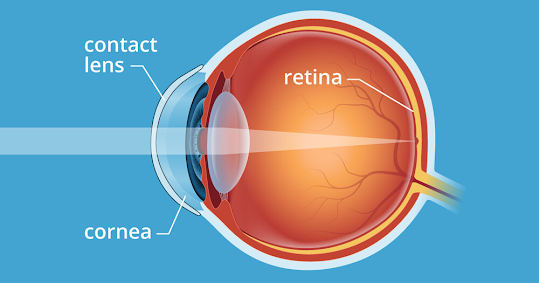How Does Contact Lens Work For Our Eyes | How Contact Work For Eye
How Contact Work For Eye
The history of contacts and the improvements they traveled so far are fascinating subjects as many of us have been suffering several vision problems for a long time.
Here We Go with A Brief History of Contact Lense
The modern contact lenses first appeared in the early 70s, but scientists during the 16th century were precisely aware of their potential based upon onwards occurring theories of optics. Alas for these pioneers, the materials and approaches necessary to mass-produce contacts didn’t come along until much later.
Along with running time, Leonardo da Vinci proposed the concept of contact lenses in the fifteenth century; In 1636, Renee Descartes took this observation further by outlining the protruding contact lens. Later, in 1801 scientist named Thomas Young became the first person to wear a contact lens, which secured his eye with wax following the idea of Descartes's.
Alright let's Figure out a few considerable pointers on Taking care of Contact Lenses
We all know that contact lenses are among the safest and most effective corrective eyewear solutions available rather than eyeglasses. Thus, no need to say that a minor failure to handle and care for your contact lenses properly can increase your risk of eye infection. Studies say that approx half of disposable and frequent replacement contact lens users wear their contact lenses longer than recommended.
Wash the hands before wearing your contacts, don't forget to dry them off first. Water can harbor harmful bacteria (can be transferred to contact lenses), so always dry your hands with a clean towel before touching your contact lens.
- Wash your hands with soap before handling contacts; this helps prevent eye infections. Dry off with a lint-free towel. Wash your hands before you handle your contact lenses, but don’t forget to dry them off first. Water can harbor harmful microorganisms that can be transferred to the contact lens, so always dry your hands with a clean towel before touching your contact lens.
- Clean and disinfect your contacts according to the instructions provided by the manufacturer or your doctor. Never use tap water, saliva, or bottled water to clean lenses, as these aren’t sterile and can introduce bacteria to your eyes.
- The very rare un-doing about taking care of contacts is Sleeping wearing the contacts; Many types of contact lenses are not designed to be worn while sleeping. Even extended-wear contacts come with the risk of eye infection, which is why they should still be removed at least once a week. Leaving your contact lenses in overnight blocks oxygen from reaching your cornea.
- Again, as said in the first point just extremely recently; Always wash your hands before handling your contact lenses. The best and cleanest contact lenses will still cause infection if you handle them without properly washing your hands. You should also make sure to clean your contact lens case regularly and to replace it at least every three months. Failure to replace your contact lens storage case at the recommended interval can increase the risk of complications.
Closure Words
Extended-wear contacts vary according to their usable lifetimes. Some of the contact lenses can be worn weekly, while the others are approved/prescribed for 30 days of continuous wear (even at night, you can say). Always yes, wash and rinse your hands thoroughly with mild soap and water and dry with a lint-free towel before touching your contacts; Don’t use the lotion, hand sanitizers, or oily cosmetics before handling your contact lenses. Before putting your lenses on, priorly examine them, just to be sure that they are moist, clear, clean, and free of tears.

Comments
Post a Comment